How Popular Is Peace?

The rhetorical muscle-flexing at the Republican debate at the Reagan Library in Simi Valley, California in September made Sunday afternoon at Venice Beach seem like a convention of “girly men.” The contenders engaged each other in verbal feats of strength over foreign policy, vying to establish who would be the most Reaganesque, or George W. Bushesque, in reasserting America’s role as global strongman.
Grasping the mantle of W. undoubtedly plays well before the Republican base, blinded as it is by neoconservative steroid rage. But how will this muscle-flexing play among the plurality of American voters who do not identify with either party?
The 2015 Chicago Council on Global Affairs (CCGA) foreign-policy survey “America Divided: Political Partisanship and US Foreign Policy” provides hard data about foreign-policy attitudes by party identification. The results may give the GOP’s muscle men (and woman) short-term comfort during primary season but should raise long-term concerns about whether they will get sand kicked in their faces in the general election.
At the Reagan Library, Sen. Ted Cruz promised, “If I am elected president, on the very first day in office, I will rip to shreds this catastrophic Iranian nuclear deal.” Former Arkansas Governor Mike Huckabee thundered that what is at stake with that agreement is “the survival of Western civilization.” Given that, the eventual Republican nominee “must, simply, make it very clear that the next president, one of us on this stage, will absolutely not honor that agreement, and will destroy it and will be tough with Iran, because otherwise, we put every person in this world in a very dangerous place.”
Born-again hawk Jeb Bush insisted that “the first thing that we need to do is to establish our commitment to Israel which has been altered by this administration. And, make sure that they have the most sophisticated weapons to send a signal to Iran that we have Israel’s back.”
“If I’m elected president,” Cruz promised, “our friends and allies across the globe will know that we stand with them. The bust of Winston Churchill will be back in the Oval Office, and the American embassy in Israel will be in Jerusalem.”
Carly Fiorina, former chief executive officer of Hewlett-Packard, confided that “having met Vladimir Putin, I wouldn’t talk to him at all. We’ve talked way too much to him.”
Flipping back again to defending his brother’s foreign policy, Bush asserted that “there’s one thing I know for sure. He kept us safe.”
In a 21st-century reprise of the stab-in-the-back myth that prevailed in Germany after World War I, the other GOP contenders joined the former Florida governor in standing shoulder-to-shoulder in defense of the proposition that George W. Bush’s war in Iraq had made us safer and that it was only President Obama’s pusillanimity in failing to negotiate a status of forces agreement with Baghdad to keep American forces in the land between two rivers in perpetuity that opened the door for the Islamic State of Iraq and Syria to take control of large swathes of Sunni territory. Florida Senator Marco Rubio spoke for many when he concluded that events in contemporary Iraq challenged “the belief that somehow by retreating, America makes the world safer.”
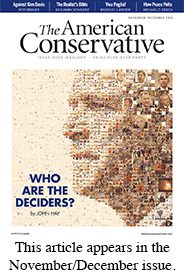 There were only a few discordant notes in this otherwise harmonious symphony of bluster. In addition to Rand Paul, Donald Trump and another rising political outsider, Dr. Ben Carson, as well as Ohio Governor John Kasich at times, all challenged the Republican orthodoxy, hinting that they might take a different approach to managing America’s role in the world.
There were only a few discordant notes in this otherwise harmonious symphony of bluster. In addition to Rand Paul, Donald Trump and another rising political outsider, Dr. Ben Carson, as well as Ohio Governor John Kasich at times, all challenged the Republican orthodoxy, hinting that they might take a different approach to managing America’s role in the world.
Paul ridiculed the notion of scrapping President Obama’s nuclear agreement with Iran as “absurd.” While promising to “vote against the agreement because I don’t think there’s significant leverage,” he said that “doesn’t mean that I would immediately not look at the agreement, and cut it up without looking to see if whether or not Iran has complied.” Kasich added that we should not unilaterally reject the Iran accord because “we are stronger when we work with the Western civilization, our friends in Europe, and just doing it on our own I don’t think is the right policy.”
Taking his art of the deal to the global marketplace, Trump promised that “I will get along—I think—with Putin, and I will get along with others, and we will have a much more stable—stable world.” Paul agreed that “we do need to be engaged with Russia. It doesn’t mean we give them a free pass, or China a free pass, but, to be engaged, to continue to talk.”
Paul called for more reflection on when we should intervene around the world. He reminded the audience that “every time we have toppled a secular dictator, we have gotten chaos, the rise of radical Islam, and we’re more at risk. So, I think we need to think before we act, and know most interventions, if not a lot of them in the Middle East, have actually backfired on us.”
“Why are we always the world’s patsies,” a chagrinned Paul asked, “that we have to go over there and fight their wars for them?” In his view of America’s role in the world, other countries “need to fight their wars, we need to defend American interests.”
Even though Paul has regressed to the GOP mean on some foreign-policy issues—opposing the Iran Deal, for example—his primary numbers remain weak, below five percent in recent polls. Most self-identified Republicans clearly embrace the other GOP contenders’ hardline rhetoric on foreign policy and national security. But the CCGA results highlight three things that should discomfit the hawks if they want to win not only the nomination but also the general election: first, independents, the largest percentage of voters, are in general far less hawkish and interventionist than the GOP base. Second, Democrats are closer to independents on many related issues. Finally, the overall trends are moving in favor of a different foreign-policy approach.
Responses to the CCGA’s question of what role the United States should take in the world can be read in two ways: primacists, those who believe in a police-like role for America in the world, could look at Figure 1 and feel vindicated that a majority of respondents in all three political categories endorse an active role for the United States. But proponents of a more restrained foreign policy can make two responses: first, support for such a stance has dropped over the life of the question, with Republicans losing 10 points—20 last year, before the campaign—and independents’ support declining almost 15 percentage points by 2015. Second, “active” can mean many things, from global economic engagement to military hegemony. As responses to other questions indicate, there is far more public support for the former than the latter.

Indeed, Figure 2 shows that in 2015 the majority of all respondents want the United States to exercise “shared leadership,” a position that seems closer to John Kasich’s moderate stance than the my-way-or-the-highway unilateralism of the would-be heirs of George W. Bush. Shared leadership might also be a euphemism for the “after you Alphonse,” buck-passing approach we saw during the Libya operation, in which Uncle Sam shared leadership in that fight by holding other countries’ coats.

To be sure, as Figure 3 indicates, the majority of Republicans think it is very important for the United States to maintain its superiority in military power. Not surprisingly, Democrats are less committed to that effort, with less than half endorsing that as a “very important” foreign-policy goal—though a majority of Democrats do see it as at least a somewhat important goal. Surprisingly, independents are about evenly divided over the priority of military superiority, and for both Democrats and independents support for it has eroded over the years. There is an almost 20-point gap between Republicans and independents, who are much closer to Democrats.

And when you drill down by region, as Figure 4 does, it becomes clear that the public just does not regard many areas of the world as “very important” to U.S. national security, with only a majority of Democrats and Republicans designating the Middle East as such, a judgment not shared by independents.

As the Reagan Library Republican debate made crystal clear, the GOP contenders are much preoccupied with the threat of Iranian nuclear weapons, despite the Obama administration’s success in negotiating the Joint Comprehensive Plan of Action with Tehran. That reflects some broader anti-nuclear anxieties among the public, as CCGA’s data confirm, but the CCGA study also adds some nuance to the story. Majorities of respondents to the general question about whether unfriendly countries getting nuclear weapons constitutes a “critical threat” agree it does, though again there is a 10-point gap between Republicans and independents, with the latter being closer to Democrats, and the percentages across the board are declining as Figure 5 shows.
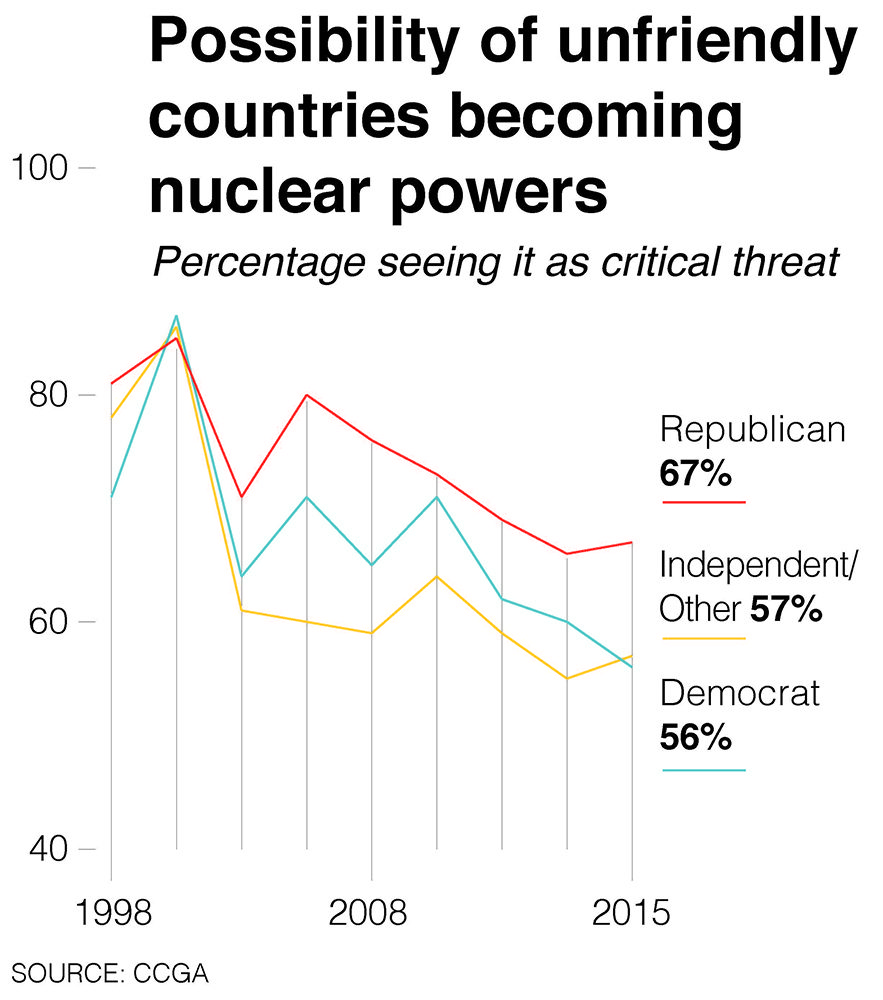
But when the CCGA asked specifically about the threat from Iran’s nuclear program, less than half of independents thought it was a critical threat, a 21-point gap with Republicans on this issue. Again, the general trend among all groups over time has been downward.
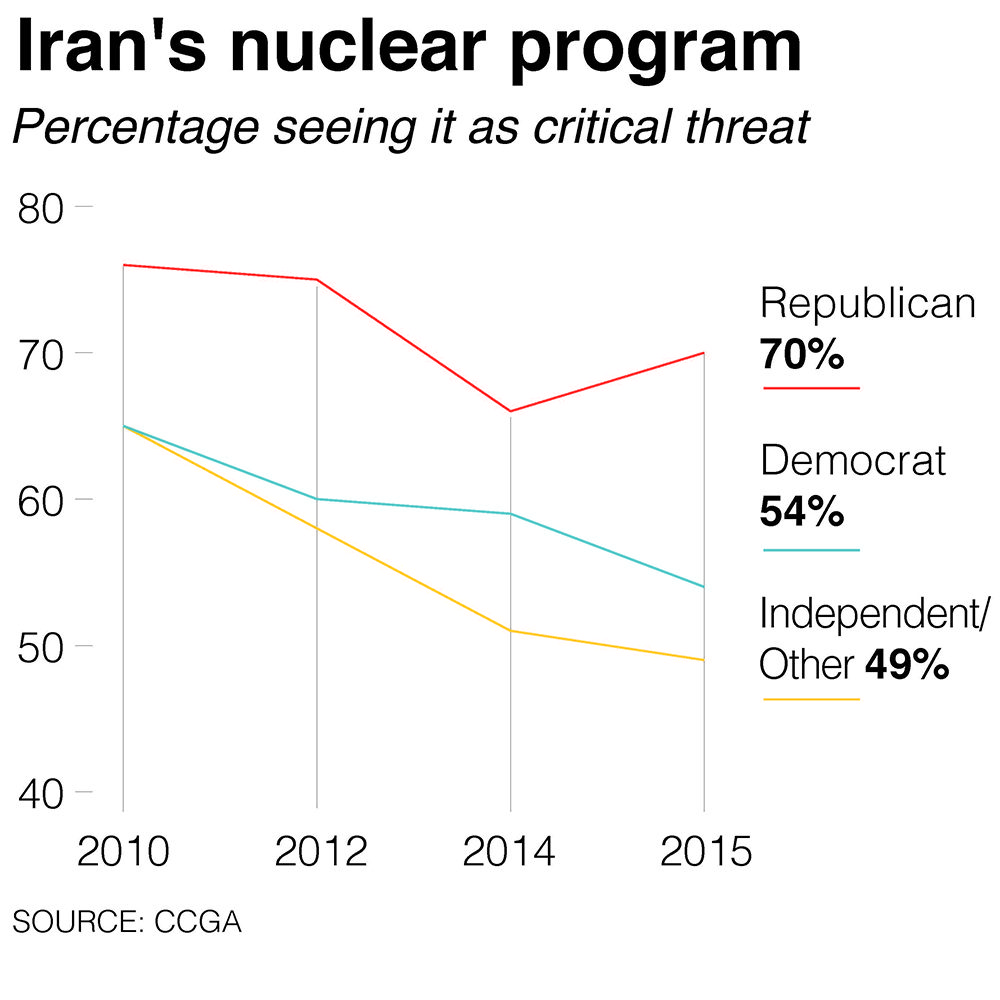
In any case, majorities of Democrats (74 percent) and independents (57 percent) support the Obama administration’s nuclear agreement with Iran, while only 46 percent of Republicans do so. And only minorities of independents (37 percent) and Democrats (44 percent) favor using force against Iran, even if it violates the agreement. By contrast, 53 percent of Republicans approve of the use of force in that situation.
Not surprisingly in post-9/11 America, majorities of all respondents regard international terrorism as a critical threat. But again there is a more than 10-point gap between Republicans and independents, with the latter much closer to Democrats, and the trend in this threat assessment is going down over the long run, even with a slight recent bump up due to ISIS.
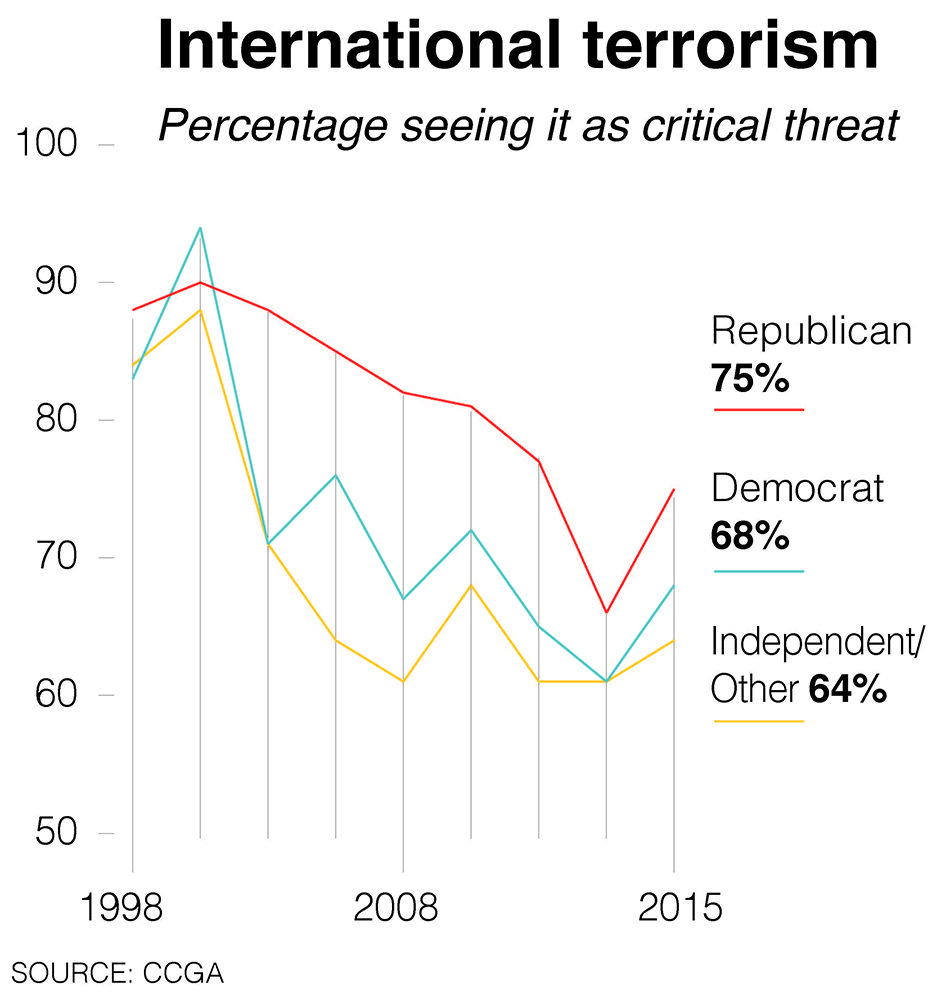
Complicating things for GOP hawks are the results of a new question asked this year about whether U.S. policy has been a contributing factor to terrorism in the Middle East today. Majorities of all respondents thought that it was, with 65 percent of independents and 68 percent of Democrats thinking it was. (Along with 59 percent of Republicans.)
Moreover, only half of independents are in favor of sending U.S. troops to fight ISIS in Iraq or Syria. Democrats (58 percent) and Republicans (66 percent) are both more bellicose.
And less than half of independents (49 percent) support keeping troops in Afghanistan past 2016 as part of our global war on terror. The figure for independents is again closer to that of Democrats (51 percent) than Republicans (68 percent).
The Chicago Council survey reveals that there are just not a lot of places the American public is itching to fight for these days. True, there is some but not overwhelming support for defending South Korea or Japan from attacks by North Korea and protecting Israel from its Arab neighbors. But there are few takers for shedding blood to defend Taiwan or Japan’s Senkaku Islands from China or the Ukraine from Russia, as Figure 8 shows.
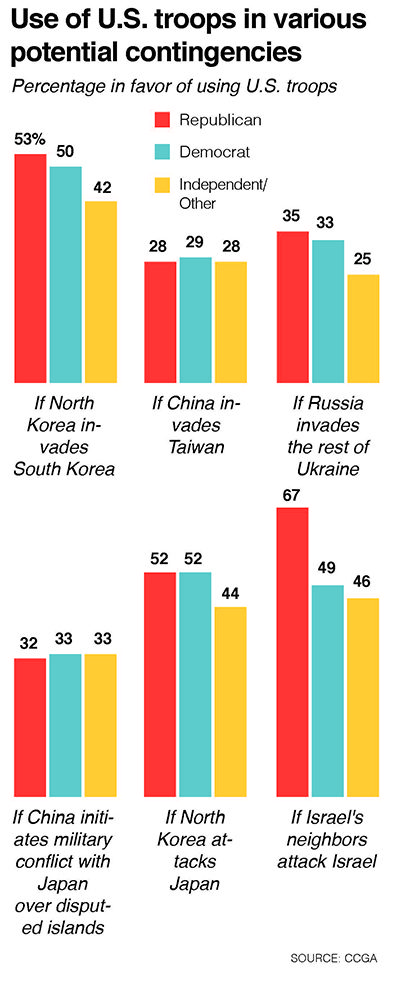
Finally, for those in the GOP who think that Israel’s and America’s interests in combatting terrorism are identical, the data suggest that majorities of voters across all categories—71 percent of independents, 76 percent of Republicans, and 82 percent of Democrats—understand that the festering Israel-Palestine conflict is a “contributing factor” to the problem of regional terrorism, even though most attribute it primarily to Islamic extremism.
One continuing puzzle is Jeb Bush’s flip-flop on the wisdom of his brother’s war in Iraq and the alacrity with which some other GOP contenders are running to hop on the bandwagon back to Baghdad. As a 2014 CCGA survey makes clear, overwhelming numbers of voters—80 percent of independents, 78 percent of Democrats, and even 60 percent of Republicans—now believe that the Iraq War was just not worth it.
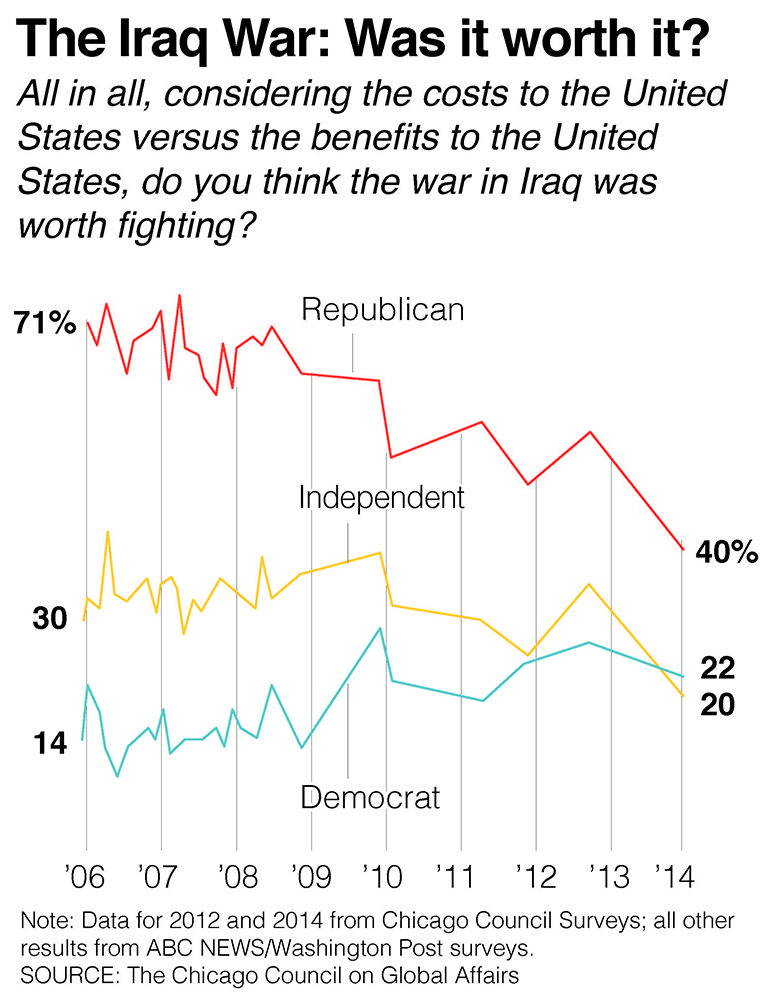
To be sure, the combination of a few deep-pocketed plutocrats and a primary election process that rewards pandering to the base rather than reaching out to the median voter constitutes a hard challenge for a candidate who wants to swim against the neoconservative current. Likewise, foreign policy is not by any means the issue voters care most about. And admittedly, foreign-policy coalition in favor of restraint does not yet command the majority.
Still, if we start with the figure of 130,000,000 voters in the 2012 presidential election and use Gallup’s 2013 breakdown of the party identification of the electorate—25 percent Republican, 31 percent Democrat, and 42 percent independent—that gives the GOP 25,000,000 votes, the Democrats 40,300,000, and independents 54,600,000. Dividing those numbers by responses by party affiliation to the Chicago Council’s question about whether the United States should play an active role in the world adds up to a potential bloc of nearly 47,000,000 voters who are sympathetic to a more restrained U.S. role in the world. As other foreign-policy interest groups have shown, you don’t need an absolute majority to get your way.
Further, there are in fact a number of crosscutting issues that could make a more restrained American foreign policy attractive to a greater number of Republican voters, as well as independents. Deficit hawks in the GOP understand that at 55 percent of discretionary spending, defense spending cannot be off the table when cuts have to be made. They also understand that the costs of veterans’ care will continue long after the last American troops leave Iraq and Afghanistan. Support for our troops, large numbers of whom now need crutches and wheelchairs to make up for lost limbs, can also mean being cautious about sending them to war.
Many Republicans are skeptical of nation-building in our own country, and there are even more reasons to be skeptical of it abroad. Libertarians like Senator Paul and a notable bloc of House Republicans fear that we are sacrificing our civil liberties at home in the name of waging the war on terrorism overseas. And the growing realization that the current scourge of the Islamic State of Iraq and Syria sprouted from the al-Qaeda seed we inadvertently planted in Iraq when we overthrew Saddam Hussein could bolster caution about future interventions elsewhere.
Think that such a platform cannot put a Republican in the White House? Recall that it was George W. Bush who successfully campaigned against nation-building in 2000. That he changed course dramatically after 9/11, with disastrous consequences, only reinforces the need for his brother or some other Republican contender to embrace his original foreign policy of humility and restraint, or else risk following Mitt Romney into political obscurity in 2016.
Republican contenders Trump and Carson have led in early polls, even though they dissent in some ways from the neoconservative foreign-policy consensus that otherwise grips most of the GOP field. Their heterodox views so far seem not to be hurting them. Those views may in fact be an asset with a surprising number of Republican voters. Thus there is no reason—least of all a good political reason—why a more restrained foreign policy couldn’t be a plank in some more credible Republican candidate’s platform, a plank that come November 2016 can win independents and with them the White House.
Michael C. Desch is professor of political science at the University of Notre Dame.